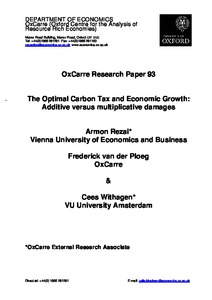The optimal carbon tax and economic growth: additive versus multiplicative damages

Rezai, Armon ; van der Ploeg, Frederick ; Withagen, Cees
University of Oxford. Department of Economics
University of Oxford - Oxford
2012
24 p.
climate change ; economic growth ; energy source ; gas emission ; taxation
OxCarre Research Paper
93
Environment
English
Bibliogr.
"In a calibrated integrated assessment model we investigate the differentia impact of additive and multiplicative damages from climate change for both a socially optimal and a business-as-usual scenario in the market economy within the context of a Ramsey model of economic growth. The sources ofenergy are fossil fuel which is available at a cost which rises as reserves diminish and a carbon-free backstop supplied at a decreasing cost. if damages are not proportional to aggregate production output, and the economy is along a development path, the social cost of carbon and the optimal carbon tax are smaller as damages can more easily be compensated for by higher output. As a result, the economy switches later from fossil fuel to the carbon-free backstop and leaves less fossil fuel in situ. This is in contrast to a partial equilibrium analysis with dmages in utility rather than in production which finds that the willingness to forsake current consumption to avoid future global warming is higher (lower) under additive damages in a growing economy if the elasticity of intertemporal substitution is smaller (bigger) than one."
Digital
The ETUI is co-funded by the European Union. Views and opinions expressed are however those of the author(s) only and do not necessarily reflect those of the European Union or the ETUI.